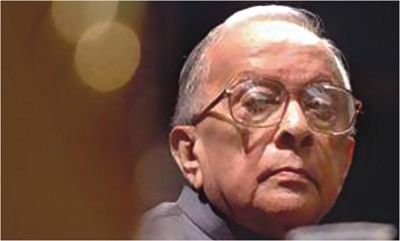<i>Jyoti Basu passes away</i>

Veteran Marxist leader and India's longest-serving chief minister Jyoti Basu died in Kolkata yesterday after battling for life for 16 days.
A beacon to Indian communist movement, Basu was 95 and is survived by his only son Chandan Basu.
The condition of the patriarch of Communist Party of India (CPI-M) at AMRI Hospital in Salt Lake locality was extremely critical for the last three days with all his vital organs--lungs, heart, kidney, brain and liver--turning dysfunctional. And an attending doctor said, "There is little hope of good result".
The news of his death was announced to the media by an emotional CPI(M) leader Biman Bose at around 12:30 hours .
“I have a sad news for you. Jyoti Basu is no more. He has left us. I cannot speak anything more at this moment,” said a sobbing Biman Bose, a long-time associate of Basu.
Chances of his surviving the latest bout of illness had dimmed last night when his personal physician A K Maity said, "Given the complications he is suffering from, there is little hope of any good result”.
Basu, who was West Bengal chief minister for 23 years from 1977, was shifted from his residence “Indira Bhavan” in Salt Lake and admitted to hospital on January 1 following an attack of pneumonia and resultant chest congestion.
Cremation of Basu will take place tomorrow.
As soon as his death news broke, the entire Indian political circle plunged into deep mourning and gloom.
President Pratibha Patil, Prime Minister Manmohan Singh, Congress chief Sonia Gandhi and a galaxy of other Indian leaders condoled the death of Basu, describing him as one of the tallest communist leader of the country.
Leader of the Opposition Sushma Swaraj described Basu as a “leader of stature whose work ethic was worth admiring”.
Trinamool Congress leader Mamata Banerjee, a long-standing political adversary of Basu's party, said, “I'm grief stricken. Jyoti Babu was a great politician.” She also announced cancellation of her party's anti-Left Front government agitation in the next three days as a mark of respect for the departed leader.
Streams of grief-stricken people from all walks of life assembled before AMRI hospital and Basu's Salt Lake house, and CPI(M) headquarters in New Delhi and Kolkata soon after his death news was beamed by television channels.
Born in 1914, Basu became a member of Bengal provincial assembly in 1946. And he had strode the Indian political scene like a colossus for more than 60 years.
He had played a significant role in the signing of Ganges water sharing treaty between Bangladesh and India.
Basu was deputy chief minister of United Front government of West Bengal twice between 1967 and 1970 and became chief minister in 1977.
He came very close to being the first Bengalee prime minister of India in 1996 but his party rejected the proposal, a decision Basu had criticised a few years later as a “Himalayan blunder”.
Even after he stepped down as chief minister due to old age and indifferent health in 2000, Basu continued to be the mentor, guide and patriarch of CPI (M).
President Pratibha Patil, in her condolence message, said, Basu "earned the unique distinction of being the longest-serving chief minister of any state.
"During his political career, he displayed his abilities as a leader of the people, an able administrator and an eminent statesman.
In Basu's deat, the nation has lost a veteran and an eminent public figure”, she said.
In a condolence message to Chandan Basu, the prime minister said Jyoti Basu's death marked “the end of an era in the annals of Indian politics."
Manmohan Singh said, “During his more than 20 years at the helm of affairs in West Bengal, he proved himself to be one of the most able administrators and politicians of independent India."
Describing Basu as “a man of great integrity with a deep commitment to secular values”, he said “throughout his long career his first priority remained the welfare of ordinary citizens, the workers and the peasants”.

 For all latest news, follow The Daily Star's Google News channel.
For all latest news, follow The Daily Star's Google News channel. 



Comments